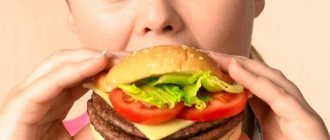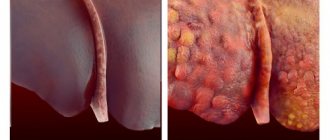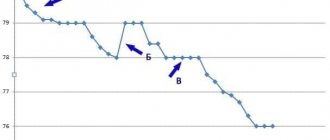The consequence of constant overeating ─ excess body weight ─ a condition in which the body mass index (BMI) is above 25. Body mass index ─ is the ratio of the main anthropometric indicators: height and body weight. To find out your own indicator, you need to divide your body weight in kilograms by your height squared.
For example, body weight is 90 kg and height is 164 cm.
We calculate: 90: (1.64 x 1.64) = 33, the resulting figure is BMI.
The BMI value is:
- from 25 to 30 ─ overweight;
- from 30 to 35 ─ first degree obesity;
- from 35 to 40 ─ second degree obesity;
- above 40 ─ third degree obesity or morbid, in which diseases inevitably develop.
In the above example, there is second-degree obesity, and body weight needs to be brought back to normal.
Most likely, you will have the following symptoms of overeating:
- Feeling like your stomach is swollen and might burst;
- Feeling of heaviness in the stomach;
- Abdominal pain;
- Lethargy throughout the body;
- It's hard to move.
If this does happen, then the best help would be a pill that improves digestion; you can take it if the symptoms are already present.
You can also take a tablet in the middle of a meal, when you feel like you are about to overeat.
In rare cases of overeating, there will be no harm from such tablets, you will simply help your digestion cope with the excess amount of food.
If you have enough strength, then it is advisable to get up and move around, you can just walk around. In no case should you jump or do any bending, this can cause the so-called “volvulus”.
Is it necessary and possible to drink water to relieve the feeling of overeating?
You should not drink water, because water will make your stomach feel even more full and add a feeling of pain.
It is best to lie down and lie down so that all processes in the stomach take place calmly, without tension.
What to do if you feel nauseous after overeating?
If you are definitely not suffering from bulimia, then you need to go and empty your stomach.
There is no need to specifically induce vomiting; this can trigger the onset of the disease (bulimia).
If you feel very nauseous, and especially if you have been drinking alcohol, then in this case there won’t even be a question.
If you doubt the quality of food and think that you might have been poisoned, then it would be a good idea to take activated charcoal (1 tablet per 10 kg of body weight)
What to do if your stomach hurts after overeating?
Sit comfortably in a chair or on the sofa so that your back is relaxed and your feet are on the floor.
Take several deep, slow breaths in and out through your nose.
Exhaling slowly will help you relax even more and relieve tension in your body.
Pat your belly.
Place your hand on your stomach and make several circle strokes on your stomach, including the stomach, navel and lower abdomen.
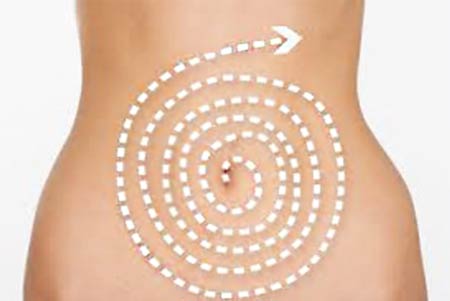
Stroking should be without pressure, light and pleasant.
Such stroking improves digestion, helps improve intestinal motility and helps the “food bolus” move along the digestive cycle.
Stretch
Stand up straight, without straining, smoothly raise your arms up parallel to each other, stretch and fix your position for a while.
At the same time, try to keep your back straight, move your pelvis back a little, securing the natural curve of the spine in the lumbar region. Release your stomach, relax it.
Breathe through your belly through your nose – you should feel your belly protrude as you inhale and retract as you exhale. This exercise will speed up the process of food processing in the stomach and start the intestines.
Warm tea
30-40 minutes after your meal, drink a small amount of warm sweet tea, no more than 100-150 grams. Warm tea will help start the digestion process in the stomach.
These tips will help you cope with the discomfort of occasional overeating.
If overeating is constant, compulsive
Everything that is written above is also suitable for these types of overeating, but in these cases the main attention should be paid to preventing overeating, i.e. take measures to ensure that this happens as little as possible, and preferably not to happen at all.
And if you regularly overeat a certain type of food, then you need to pay attention to the reasons why you are drawn to these foods.
The most basic reason is a lack of some vitamins and microelements.
The second reason, and more common, is psychological.
I have written several articles on the psychological reasons for overeating, can you read them about why and why this happens?
But I want to answer the most common and more individual questions about overeating certain foods.
How to get rid of overeating?
Independent measures
It is difficult to get rid of it on your own, but it is possible, and only if you are overweight or first degree obese.
More severe degrees of obesity require the participation of a specialist. To switch to “new rails” you need to set aside time ─ say, a month’s vacation. This is necessary because you will have to figure out your own specific needs and eat according to the clock at first.
We start by finding out our own BMI and ideal weight.
The diet is calculated based on ideal weight, not actual weight. Let's say a 45-year-old woman, 165 cm tall, weighs 90 kg, but should weigh 65 kg. We carry out all calculations based on the ideal weight – 65 kg.
Next, you need to find out how much energy (in calories) is consumed per day. A middle-aged woman who is not engaged in heavy physical labor spends on average 1,500 to 2,000 calories per day. All data on how much energy different types of work require is available in the public domain.
Next, you need to understand what foods and how much you can eat per day in order to meet the required caloric intake.
There is nothing complicated about this, you need accuracy and scrupulousness.
You can eat everything, but not going beyond the established caloric content. At first, you need to buy electronic scales and weigh everything that will then be eaten.
So, to gain 500 calories, you can eat 100 g of oatmeal, 100 g of 10% cream, 100 g of beef liver with 100 g of fried potatoes, or replace all this with 100 grams of salami. The calorie content is the same, but the feeling of fullness caused by stretching the walls of the stomach is different.
Therefore, it is advisable to choose different foods every day to get joy from food.
It is important that the diet is complete: contains proteins, fats, carbohydrates, minerals, vitamins and clean water.
To master all the information and create your own diet, time and patience are required; the ratio of nutrients and their calorie content must be clearly understood. After all the nuances have been clarified, you can get involved in everyday life ─ but with a full understanding of what is eaten and why. When a person is completely “in the know,” then the need to accurately count calories disappears, since the boundaries are already well known.
During the period of getting used to proper nutrition, you need to make friends with your own body and learn to listen to yourself. With a normal diet, there is no constipation or other intestinal problems, bad mood, or sleep disturbances. If something goes wrong, you need to find out the reason and eliminate it.
The optimal break between meals is 3 hours, during which time the previous portion has time to be absorbed and the intestines work evenly. Eating food in small portions at regular intervals ensures a stable level of blood glucose, so there is no “brutal” appetite and no night “watch”.
The best serving size is one glass. It is advisable to buy a set of dishes with a small diameter of plates, on which such a portion looks sufficient.
It is necessary to analyze episodes of automatic eating, when food is consumed while listening to music, reading, TV or conversation. These are trance states when a person does not understand what and how much he eats.
It is important to only eat while eating ─ and nothing else. Any distraction from the saturation process automatically leads to “overdoing it.”
You can cope with overeating on your own if your BMI does not exceed 35 or your obesity does not go beyond the first degree. In all other cases, the help of a specialist is required.
Psychotherapy
Obesity of the second and third degree is evidence that a person has either long-standing and deep psychological problems or severe somatic illnesses and needs to undergo a clinical examination.
The help of a psychotherapist consists in identifying the true personal problems that led to weight gain. These may be depressive spectrum disorders, intrapersonal conflict, or an excessive reaction to traumatic events.
A psychotherapist will help you find the right motivation to make your new type of eating a joy.
Additional Methods
The most promising method of treating obesity is considered to be bariatric surgery, when either a restrictive ring is put on the stomach, or parts of the intestine are connected directly to each other to prevent the absorption of nutrients.
For those who are not ready for such radical changes, we can recommend wonderful books and films that help to understand the problem in its entirety.
Medicines give a temporary effect, after they are stopped, the weight returns. The main thing to achieve the goal is to change your internal attitudes and start eating in order to live, and not replace food with other everyday joys.
Books
These books are based on personal experience, they are written by those who managed to overcome their food addiction. There are many publications - both domestic and foreign. The best are considered:
- Breaking Free from Emotional Eating by Jenine Rothes;
- “Fat is a Feminist Issue” by Susie Orbach;
- “Intuitive eating. How to stop worrying about food and lose weight” from Svetlana Bronnikova;
- Louise Hay, The Healing Powers Are Within Us.
Any of these books deals with the pressing problems of a fat person. These books show a path that anyone can follow if they want.
Documentaries
The best Russian film on this topic is “Thick and Thin” by Elena Pogrebizhskaya. In it, people honestly talk about what led them to eating disorders and how they managed to cope with it. The plot of this film will resonate with people with similar problems.
You can always cope with overeating, regardless of the amount of excess weight.
In continuation of the topic, be sure to read:
- Preparation and conduction of FGDS (fibrogastroduodenoscopy)
- Compulsive overeating: methods of getting rid of pathology + books and films on the topic
- Natural Methods to Speed Up Metabolism
- What medications should I use for increased gas formation?
- Rectal cancer: symptoms, stages, treatment and prognosis for life
- Details about the coprogram: preparation, conduct and interpretation of the analysis
- How to treat diarrhea after antibiotics in adults: first aid and further therapy
- More about hemorrhoids: causes, symptoms and treatment methods
- Causes of bloating and increased gas formation, treatment methods
- Lactose intolerance in adults: how does pathology manifest itself and how to confirm the diagnosis?
If you've eaten too much sweets, what should you do?
If you have eaten a lot of sweets and have a feeling of fullness, nausea, or stomach pain, then you can drink unsweetened, warm tea in small sips.
And after the food is digested and the discomfort in the stomach goes away, it is advisable to drink more liquid in the next 24 hours than always, but also in small portions so as not to stretch the stomach - 150 - 200 grams.
It may not be strange, but after overeating sweets, you will crave food rich in simple carbohydrates more than usual.
If the problem of overeating sweets is relevant for you, then read the article “How to eat less sweets”
When you overeat sweet foods, your blood sugar literally goes off scale, and the pancreas secretes a huge amount of insulin.
Insulin sends sugar into the cells, and thus the reserves of adipose tissue are replenished.
Therefore, the next day after such an overeat, it is advisable to eat more food containing protein and complex carbohydrates.
Should you eat less after overeating?
The very moment of overeating - throwing a larger amount of food into the stomach than usual - is stress for the body.
And if the next day you decide to do yourself a fasting day, then this will also be stressful for the body.
When and why do you need to do fasting days? Do fasting days work for weight loss? - article
Therefore, you need to eat the same amount as you ate before overeating, that constant, daily norm.
You can only change the composition of the food - reduce, and perhaps eliminate, fatty and sweet foods.
It is advisable to increase the amount of complex carbohydrates that contain more fiber (dietary fiber), or, more simply, vegetables.
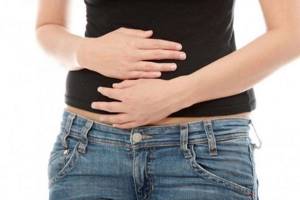
You just need to keep in mind: if vegetables are quite rare guests in your diet, then it is important not to overdo it, otherwise you will again create unpleasant sensations in your stomach.
Despite all the usefulness of vegetables rich in fiber, this is also a kind of burden on the digestive tract.
When digested, dietary fiber will pick up and absorb excess fats remaining in the intestines after overeating.
How to avoid overeating in the future
Overeating is dangerous not only in itself, but also because of its tendency to repeat. You may relapse again in the future. How to avoid this? Overeating, like any other addiction, can be overcome after identifying the trigger mechanism and the reason that led to it. Here are the main cases.
- Too strict diet. The capabilities of the human body are limited. And, if your diet objectively lacks nutrients, vitamins, minerals, and various taste stimuli, you will break down one way or another. When choosing a diet, choose techniques that include a variety of foods and dishes, and meals that are regular and sufficient to meet your needs.
- Lack of will. There are food items in the refrigerator for tomorrow, but you went crazy and ate them today, even though you are not objectively hungry. What is the problem? Perhaps it is your inability to control yourself. Lack of will and lack of control are common causes of breakdowns and overeating. You are unlikely to be able to quickly develop your will, but you will be able to protect yourself from additional temptations. It is enough to remove everything tempting from the refrigerator, buy food strictly for one day, and ask household members to “keep an eye on you.”
- Emotional stress. A separate category is the so-called emotional overeating. Stress, lack of sleep, and serious mental stress worsen mood and gradually lead to depression. Eating food, in turn, releases additional joy hormones. Instead of food, you should use something else to achieve pleasure: sports, walks, air baths, your favorite hobby.
- Distractions. It has been proven that while sitting in front of the TV or computer, people eat on average 30% more than usual. The same thing happens if you are sitting at a table and talking with your interlocutor. You need to concentrate on eating in order to stop in time.
By dealing with the reasons for overeating, you will increase the effectiveness of diets and be able to give them up completely over time. After all, proper nutrition without excess is the best way to maintain a healthy figure and maintain normal health.
If you overeat at night or in the evening, what should you do?
If you are attacked by a glutton right before bed, and you feel uncomfortable, then first understand which discomfort is stronger: psychological or physical?
Everyone knows perfectly well that you can’t eat at night, and if you eat a lot at night, then it’s practically a crime.

